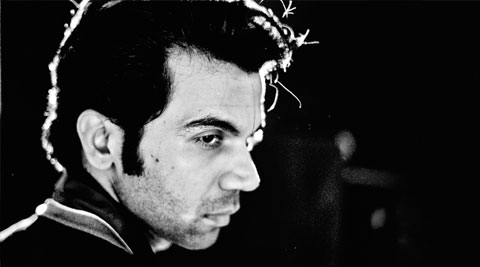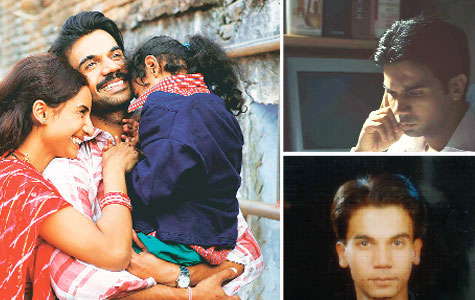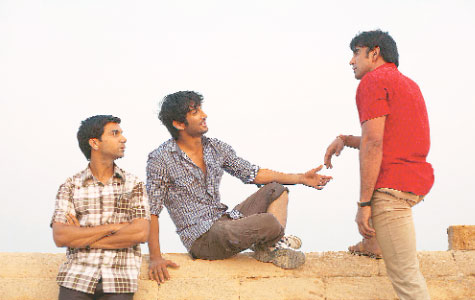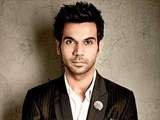Rajkummar Rao: From a regular guy to a National Award winner

SUMMARY
In the mid-2000s, when neither airconditioned buses nor the Metro plied between Gurgaon and Delhi, Rajkummar Rao would take the Haryana transport bus to the capital every day. Leaving home at 7.30 am on crowded buses that threatened to break down every few metres, he would first attend classes at Atma Ram Sanatan Dharm College in Delhi University's South Campus, and then head to Sri Ram Centre Repertory Company, returning home only past 11 in the night. The journeys were long and tiresome but the aspiring actor had no time to waste. He would turn these trips into opportunities. Observing people who regularly boarded the bus, he'd analyse their personality, and jot down their quirks. Sometimes he would playact, pretending to be a deaf-and-mute person, to see how people around him reacted.
Once, he showed up at a bus stop near Bengali Market as a self-flagellating shaman, in black costume and make-up, whipping himself in public. "A crowd started to gather until a cop shooed me away," says Rajkummar, speaking through the din of the blow dryer as he readies for his shot on the sets of Dolly Ki Doli, an Arbaaz Khan film where he plays the lead, in Madh Island, Mumbai.
The diary where he meticulously made notes is still with him, but Rajkummar no longer needs it. The 29-year-old actor, who made a striking debut in Dibakar Banerjee's ensemble Love Sex Aur Dhokha in 2010, is one of the most promising talents in the country. His career boasts of a 100 per cent box-office success rate. His performance in Kai Po Che as a young Gujarati with quiet ambition and drive is as lauded as his morally ambivalent, if not downright offensive, characters in Ragini MMS and Queen. But it's his portrayal of the strengths and vulnerabilities of slain human rights lawyer Shahid Azmi in Hansal Mehta's Shahid that established Rajkummar as a performer. That role won him the National Award earlier this month. It also proved that despite his average-Joe looks and a complete absence of film connections, he could carry a film on his shoulders. That led to his next big role, the Fox Studio-backed Citylights, directed by Hansal Mehta.
 Rajkummar Rao
Rajkummar Rao
Everyman's hero Rajkummar plays the lead in Hansal
Mehta's Citylights (Left) after a National Award-winning performance in Shahid (right above); and (right below) from the family album, a young Rajkummar in Class X
The sun has already set by the time Rajkummar wraps up the shoot for a reality show, where he is making a guest appearance. Four hours have been spent playing judge to a bunch of youngsters who aspire to a career in films " a place where he was at, not five years ago. He leads the way to the no-frills vanity van he shares with a colleague. Inside, he takes the chair opposite the mirror, but turns it to face away from his reflection. Dressed in a black-and-white shirt paired with a jacket, he seems to be on a high from the dance performance at the show, and smiles at the recollection of a childhood spent on stage. "Very few know that I am a trained dancer. Audience applause is part of my earliest memories," says the actor.
His mother, Kamlesh Yadav, 54, says he nursed the dream of becoming an actor since he was a boy, and steadily worked towards it. "He enrolled himself in martial arts and dance classes and even switched schools "from Siddheshwar Mandir School to Blue Bells " after Class X to improve his English," she says.
None of this could have come easy. In the years he was growing up, Rajkummar's was a middle-class joint family " a house complete with grandparents, two uncles, their wives and a battery of cousins " and his father was a government employee in the revenue department. Times were tough, admits his mother. But Rajkummar doesn't wear the family's and his own hardships as a medal around his neck, choosing to play them down. "For two years, my teachers paid my school fees," he says. "But no one ever discouraged me from pursuing my dream."
By the time he finished school, Rajkummar had worked out a roadmap " a stint in theatre followed by film school. So, along with a degree in commerce from Delhi University, Rajkummar enrolled himself with a Delhi-based theatre group Kshitij for a year, before joining the two-year course at the repertory. The results showed early on, says Mukesh Chhabra. A prominent casting director in Bollywood today, Chhabra was Rajkummar's senior at SRC and has often seen him perform on stage. "He had the fire in him," says Chhabra who later cast Rajkummar in two crucial films of his career, Kai Po Che and Shahid.

Kai Po Che was a turning point because it put his face on the posters.
In 2006, he joined the Film and Television Institute of India (FTII) in Pune, which had reinstated the acting course in 2004. He hoped it would open the doors to the regional and world cinema that he had, until then, only heard of. Second, it would take him closer to Mumbai, where he could bank on the FTII alumni network in his Bollywood "struggle". His friend from the film institute, Dev Agarwal " also the cinematographer on Citylights " speaks admiringly of Rajkummar's hunger to learn. "All of us were devouring cinema but he had an academic approach to it. He never wasted his time in idle chatter, discussions on films with him were always intense and analytical," says Agarwal.
Rajkummar says he cannot quite trace the root of his love for cinema. But it probably lies somewhere within the four walls of his Gurgaon residence. Located in the part of the satellite city that has remained untouched by high rises and glass-fronted malls, it is a modest house, flanked by dusty roads. His fondest memories of childhood revolve around the movie marathons that would take place on Sundays, where the entire family watched two to three films in one sitting. But he grew up in awe of the medium, never of the stars in it, unlike most people who join the film industry.
By our third meeting, it is evident that Rajkummar is that rare professional who does not believe that an actor or a "star" should be placed on a pedestal. Every time he steps into a room full of people " be it colleagues or strangers " it is as an equal. He doesn't carry the burden of fame in the form of a coterie, choosing to respond to everyone who approaches him. At the acting workshop for Focus, theatre producer-director Akarsh Khurana's directorial debut where he plays the lead role, he engages with each member of the cast and crew. When Khurana asks actor Hussain Dalal to "rehearse the lines properly with the National Award-winning actor", Rajkummar turns a shade red at the good-hearted teasing.
While he shows a refreshing lack of entitlement even after a successful run, he was clear-eyed about his limitations when he had set out. Rajkummar knows he is no heartthrob and a bunch of teenage girls aren't going to chase him down the street, well, at least not yet. During his admission process at the FTII, says brother Amit, Rajkummar told his interviewers that they ought not to reject him based on preconceived notions. "During my early days in Mumbai, I had worked on my body to gain muscle. But whenever I would queue up to audition for ads, I'd almost always be rejected because they wanted models to have a certain kind of look. I knew my success depended more on my work than my appearance," he says.

The actor (left) and his family in Gurgaon (right). Pic: Amit Chakravarty and Oinam Anand
Luckily for Rajkummar, who moved to Mumbai in 2008, he was entering an industry where the rules of engagement had changed quite a bit. Bollywood was learning to appreciate actors, even as it gushed over the stars. The first break came early. On one of his visits to FTII, he saw a news clipping that said filmmaker Dibakar Banerjee was looking for newcomers for his next film. He immediately returned to Mumbai. " (Casting director) Atul Mongia asked me to mail my pictures, but I didn't hear from him after that, despite repeated attempts on my part." Then, one day Mongia called the actor, asking him to source a number of another FTII graduate. That simple task became his mission for he knew it was the only way to speak with Mongia again. "Little did I know that the actor whose number I was so desperate to find, would be my chief competitor for the role," says Rajkummar with a laugh. But he nevertheless bagged the role of a supermarket supervisor, who woos a girl and then makes a sex tape with her in Love Sex Aur Dhokha (LSD). Neha Chauhan, Mongia's then-assistant who auditioned Rajkummar " she also played the girl he records on video " says the actor was a clear winner since the first audition. "He didn't limit himself to the character described in the scene; he interpreted Adarsh in flesh and blood, bringing a certain vulnerability to his kameena character," she says.
Although part of an ensemble, Rajkummar's performance in LSD won him rave reviews. Ekta Kapoor offered him a role in the first installation of the horror film Ragini MMS. Rajkummar was reluctant as the part seemed similar on paper to LSD, but he took it up on Mongia's insistence as a challenge to play it out as distinctly as possible.
By then, Rajkummar was hoping to bag lead roles. But he didn't sit and wait for them to come by, instead choosing to take up supporting roles with "good filmmakers and actors on script-driven films", such as Reema Kagti's Talaash and Bejoy Nambiar's Shaitan, in the hope that it will help him showcase his talent. That paid off. His role as a cop working under Aamir Khan in Talaash caught Khurana's eye. Similarly, his role in Gangs of Wasseypur II as Shamshad Alam would help him find his most challenging assignment: playing Shahid Azmi.
Though it was meant to be a larger role "as prominent as Nawazuddin Siddiqui's " Shamshad's role was eventually shortened. Impressed by his performance, Kashyap recommended Rajkummar to Hansal Mehta, who signed him on, albeit reluctantly. To the actor, it was an opportunity to play a solo lead and showcase his talent through the turbulent life of the human rights lawyer. With Mehta, it would be the beginning of a friendship and, in their words, a lifelong creative collaboration.
Rajkummar went to great lengths to play the role. During the nine-day schedule in Himachal Pradesh, the actor also assisted the production and direction teams of the tightly-budgeted film. "I most enjoyed teaching the local children how to perform namaaz," says the actor, who learnt it from a make-up artiste on the sets of Talaash.
But it took much more to get under the skin of the protagonist he was to portray. He started with extensive conversations with Azmi's youngest brother, Khalid about the lawyer's life, his stint at a jihadi training camp, his relationship with his family and wife. Studying the Quran helped him understand Azmi's disillusionment with the camp, and hearing about his wrongful arrest explained his decision to fight for the terror accused. Spending a week in the hole-in-the-wall house in Dongri where the film was to be shot brought Azmi alive to him.
Research, he adds, is the backbone of his performances. For his role in Kai Po Che, a Gujarati crew member became his temporary voice and accent coach, also educating him about the culture of the community. Even the bit role in Shaitan had him consulting his Maharashtrian friend on the body language of Mumbai cops. During the shoot of Citylights, Rajkummar lived in the small town of Sadri in the Pali district of Rajasthan for a month, he grew a moustache, became well-versed with the dialect, and later, even went shopping for his clothes with the stylist. (In the film, he plays Deepak Singh, who migrates from Rajasthan to Mumbai with his wife and daughter, in search of a better life, but finds the metropolis a hostile place.)
His appeal, for now, is limited to the multiplex audience. Manoj Desai, owner of the Gaiety-Galaxy theatres and Maratha Mandir" the hub of single-screen films in Bandra and Dadar respectively, where Salman Khan and Shah Rukh drive the business " pauses to recollect who Rajkummar is. He says the actor's next, Citylights, will play at his Bandra property but only because there are few big films releasing this season. In his opinion, "the newcomer" needs a few more commercial successes in lead roles before the masses take to him. Rajkummar is probably aware of this fact. It could be one of the reasons he considers Kai Po Che a turning point. "It put me on posters, which helped me access the commercial cinema space and reach out to the masses," he says.
It was also for commercial reasons that Rajkummar opted for the more ambiguous surname "Rao" over his original "Yadav". Although filmmaker Banerjee had recommended, in jest, an easier solution: that Rajkummar refer to himself as RK. "But I don't see myself as an RK, whom I envision as someone who wakes up to a glass of juice served by a white-gloved attendant and then drives to the set in his limousine amid thronging fans," says Rajkummar, laughing.
His own life is far simpler in spite of the success. He wakes up on his mattress in the living room of the one-bedroom rented apartment in Andheri he shares with Agarwal, and makes his own tea. He hasn't traded his old television set for an LCD screen, nor installed an air-conditioner in his flat. A teetotaler, his only indulgence is the Audi SUV that he recently purchased. As Mehta says, it is this quality of staying rooted that ensures Rajkummar walks in with a clean slate into any film, never bringing in the baggage of a 100 per cent success rate.
The challenge, say well-wishers, is that he stays that way, and does not get drunk on celebrity " unlike Siddiqui and Irrfan, for instance, his success, including a National Award, has come early. But humble as he is, Rajkummar, who has also been signed by Rajkumar Gupta for his next film based on Chetan Bhagat's 2020, is not one to rein in his ambitions: from now on, he has decided, no more two-bit characters, only lead roles. Even as he says this, Rajkummar adds a quick disclaimer: "But offer me a Satya and I will play a Bhiku Mhatre any day."
With inputs from Anushree Majumdar















comment:
p_commentcount